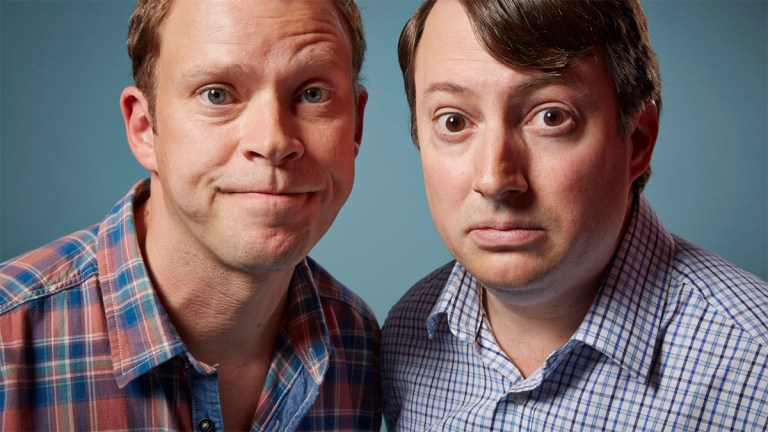The Rejected BBC Sitcom That Spawned Peep Show
Before Mark and Jez, there was Paul and Otto.

Thank goodness for no-shows. Had the controller of what was then BBC Choice turned up to the ‘rehearsed read’ for a potential studio sitcom in the very late 1990s and liked what they’d seen, we wouldn’t have Peep Show. As it reportedly went: BBC Two passed on it. BBC Choice didn’t see it. And everything ended happily ever after.
Peep Show creators Jesse Armstrong and Sam Bain first met the show’s stars David Mitchell and Robert Webb on a BBC comedy writing project in 1998. That went nowhere, but sparked a partnership that led to the acclaimed nine-series sitcom on Channel 4. Before it led there, it almost led to “All Day Breakfast”, the rejected comedy out of which Peep Show grew.
As Robert Webb describes it in the introduction to 2008’s Peep Show: The Scripts and More, “All Day Breakfast” was about “two men in their mid-twenties, sharing a flat; one called Otto – deluded, talentless and invincible; and one called Phil – crushed, anal and frightened.” Sounds familiar.
Speaking at the BFI Southbank 20th anniversary event in February 2024, Webb calls the unmade series “…kind of the parent of Peep Show in that there were versions of Mark and Jeremy there.”
Webb was to play Otto, a much bigger and wealthier version of Jeremy, described to Mustard Magazine by co-creator Sam Bain in 2008 as “an insufferably posh idiot”. Otto was a privileged, overconfident extrovert whose father was an arms dealer and who owned the flat he shared with Phil. (In early drafts of Peep Show, Jeremy owned their flat instead of Mark, but a script note wisely suggested the power-dynamic swap.)
Armstrong told Mustard, “We took [Otto’s] DNA, removed his poshness and a certain heightened sense about him,” and the result was Peep Show’s workshy wannabe musician Jeremy.
“We knew this was a good character, this arrogant, overconfident/underconfident guy who’s overly concerned with what people think of him, thinks he’s incredibly talented but isn’t, but also has a thick skin about that. We knew that Rob [Webb] was brilliant at playing that.”
(Robert Webb did get to play Otto’s insufferably posh idiot type in a recurring sketch on That Mitchell and Webb Look about a Withnailian fantasist and his sidekick, he says in the script book intro: “…we just made him a tramp and called him Sir Digby Chicken-Caesar“.)
Otto’s flatmate in “All Day Breakfast” was Phil, whom Sam Bain described to Mustard as an anxious, neurotic worker bee, “a guy who aspired to being a suited member of the business community.” The problem with Phil, as Mitchell pointed out at the 2024 BFI anniversary event, is that it was much harder to make him funny than Otto:
“Phil is a lot funnier, it turns out, if you can hear what he’s thinking. What he does is incredibly pedestrian and unamusing, but what he’s thinking is potentially funny, and that totally redeemed Phil/Mark as a comic character, the fact that you could suddenly know what was going on inside his head.”
“All Day Breakfast” had been designed as a traditional audience-based, multi-cam studio sitcom, but the solution for Phil’s character came via a formal experiment. Combining a desire to push the sitcom format in the wake of The Royle Family and Spaced, with future Peep Show producer Andrew O’Connor’s idea of making a sort of live-action Beavis & Butthead in which two characters commentate on TV clips, Peep Show’s POV concept was born. And it saved the character of Phil/Mark.
As David Mitchell jokes in his introduction for 2008’s Peep Show: The Scripts and More, without the show’s unique format, the premise alone makes it sound deceptively generic.
“…if you take away the POV filming and the interior monologues, what remains of the Peep Show pitch reads almost identically to the pitch for Men Behaving Badly, which not only already existed but starred Martin Clunes and Neil Morrissey rather than two people no one had ever heard of. So we really needed that hook, and it was partly my fault that we needed it – if only I’d had the foresight to be Martin Clunes, it wouldn’t have been necessary.”
Putting Mitchell’s thoughtless non-Clunesness aside, his Peep Show character Mark’s self-conscious, hyper-dissecting character made a perfect fit for the internal monologue format. Without hearing Mark’s ruinous thoughts, his character wouldn’t be entertaining. Armstrong told Mustard: “Unless you have a performance that nails it, self-awareness is death to comedy. Self-conscious people don’t tend to… blurt things out. That’s why writing voiceovers has been key to getting Mark’s character.”
And that’s how failure prompts innovation, and how one of the UK’s most ingenious, funny and distinctive comedies of all time grew out of a rejected idea. Nothing is ever wasted. RIP, Otto and Phil. You died so Jez and Mark could live…fretfully, and in Croydon.
Peep Show is available to stream on Channel4.com in the UK.
